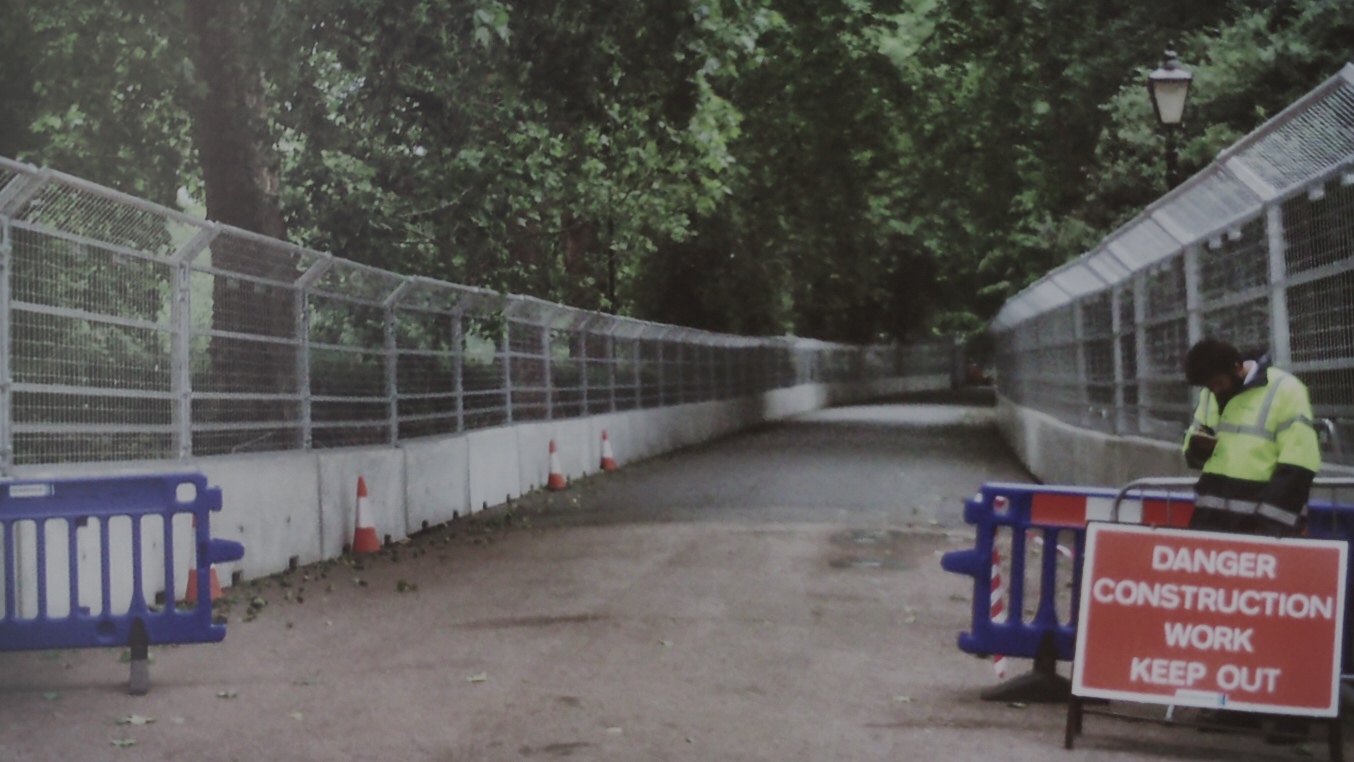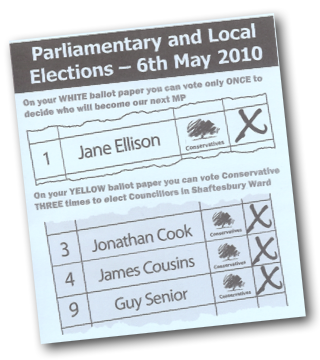Yesterday I highlighted some of the things canvassing is not. Today I want to go through some of the things canvassing is, and my thoughts at the end of this particular campaign. While the media will concentrate on Cabinet resignations and pressure on Brown, the life of a party activist is less glamorous and less dramatic; we knock on doors and talk to people.
Canvassing to identify support
At its simplest level canvassing is about identifying your supporters so you can encourage them to vote. If you imagine a constituency in which exactly half the population support the Conservatives and exactly half support the Labour party the winner would be decided by who was best at getting their supporters out to vote for them.
Canvassing as an opinion poll
But it also works as a simple opinion poll. Because we are continually canvassing on issues and support we can track changes. It isn’t as statistically valid as proper opinion research, we can’t select a ‘representative’ sample that reflects the country as a whole, but we do get an idea of the way things are going. If you canvass ten people and one has switched, that’s a 10% swing.
I will say from the outset that I don’t actually know any of the figures in Wandsworth or Battersea, I’m no longer involved at that level of political campaigning – I’m just an activist who goes where I’m told. But that doesn’t mean I don’t get a feel from the doorstep.
The feel on the doorstep
And that doorstep feel is an important indicator. The 1992 general election was the first I was actively involved in, and many will remember that, when called, it was seen as being incredibly close. A few days before the actual election one of the older and wiser heads in the association I was involved in told me that we’d win nationally. Not because of the polls, but because “you can see people aren’t ready for Labour”. I wrote it off until some months later when Neil Kinnock, in a documentary interview, said he knew he was going to lose not because of any polling, but because when he met members of the public he could “see it in their eyes”.
Its important to remember that while opinion polls give broad projections, it’s the people who go and vote that decide the result of elections, not the people who answer pollsters.
These are my opinions based on my own experience and during this campaign almost all my canvassing has been in Wandsworth, most in Battersea and the largest part of that in my own ward. If someone tells you its totally different next door in Lambeth or Richmond, they may well be right.
The BNP
It’s a real pleasure to be able to say that I’ve only canvassed a few BNP supporters, indeed I could count on the fingers of one hand the people who have told me they are voting for the BNP. In Wandsworth, at least, they are not a political force. Hopefully that is the case everywhere else in the country.
Minor parties
Again, these have not featured on the doorstep, which is totally at odds with the recent polls showing UKIP in third place ahead of Labour. They may well achieve that level of support, but it won’t be in Wandsworth.
By far the most popular of the smaller parties has been the Greens. Not a huge number of them, to be sure, but certainly more than any other party.
I’m also going to include the Liberal Democrats in this category, although I do so with some caution. Wandsworth has traditionally been a two party borough, there are no Lib Dems on the council, although there are some areas in the borough where the Lib Dems are active. It might be because I’ve not been in those areas that I’ve met so few intending to vote that way.
Labour
It’s safe to say Labour are not having a good time of it. And it shows on the doorstep.
Their vote is definitely soft. Many who rejected the Conservatives in favour of Blair’s Labour Party are returning to the Conservatives if they hadn’t already. But I think the real problem Labour face are their supporter who just won’t go out and vote. It was very much the problem we faced in 1997, people wouldn’t vote against us, but we couldn’t get them to vote for us either. Around three million people fewer people voted in 1997 than had in 1992. Less people voted Labour in 1997 than had voted Conservative in 1992. Blair won not just because Tories switched to him, but also because they stayed home in huge numbers.
Oddly, one of the ways I see this relates to ‘Myth 3’ from yesterday’s post. It means that people can tell us they aren’t voting for us, but give us good news as well: “I always voted Labour, but I’m not doing that again.”
I find it hard to believe this isn’t going to be Labour’s 1997. The electorate want to punish Labour, and will; the question is whether they will be satisfied by this election, or whether the anger will carry over into the general election when Brown or his successor calls it.
Who’s winning?
Easy one for me. The Conservatives. As a Conservative each successive election since 1997 has been nicer than the last, but the change has been much more marked over the past two years. People are pleased to see us and enthusiastic about voting for us again.
Of course, the electoral system for this election means it’s impossible to predict a result. The final scores depend as much on the spread of votes between minor parties as it does on the Conservatives’ lead. I wouldn’t put a bet on the numbers of seats. But I’d put a bet on Cameron being the leader with the biggest smile when the results come in on Sunday.

 I make no apology for, once again, asking people to vote for me. Putting yourself up for election is a fairly egotistical thing to do, as is having an eponymous blog. And although I’ve never introduced myself on the doorstep (my patter is to call “on behalf of the Conservatives” rather than putting a particular name forward) I have no shame in promoting myself as the best choice for Shaftesbury for the next four years.
I make no apology for, once again, asking people to vote for me. Putting yourself up for election is a fairly egotistical thing to do, as is having an eponymous blog. And although I’ve never introduced myself on the doorstep (my patter is to call “on behalf of the Conservatives” rather than putting a particular name forward) I have no shame in promoting myself as the best choice for Shaftesbury for the next four years. The council have published the
The council have published the